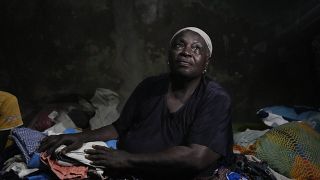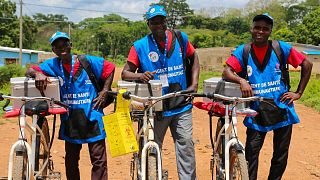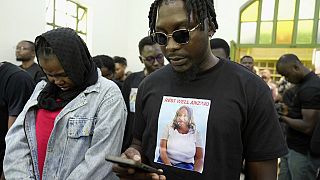Kenya
At this ward in the Nightingale Hospital in Kisumu, malaria patients are bedridden. Access to treatment remains a challenge, with public hospitals often grappling with medication shortages, and private facilities demanding exorbitant fees for care.
Wilson Otieno has been admitted to a hospital three times for malaria and has received outpatient treatment countless times.
It's expensive for the 33-year-old accountant and father in the lakeside city of Kisumu.
He says many patients opt for private treatment.
"In major cases, people opt to go to private facilities where they are going to get faster medication and a quality medication but it is never pocket friendly,” says Ogola.
Lenser Pauline, regularly brings her young daughter to the hospital for treatment for malaria.
"It is very expensive when treating it continuously, monthly like, it is very expensive, some of us come from a far away area, that is far away from the hospital and we need to use transport," she says.
Oswal Omondi, a medical officer at the hospital, underscores the frustration faced by healthcare workers and patients alike due to medication unavailability and high costs.
"As a health care worker you would like to give the drug of choice for the first line which is artesunate but because of unavailability or it’s just too costly for a population, most times we prescribe the drug but the patients don't get it from the pharmacy due to either unavailability or the cost,” Omondi says.
Malaria's impact transcends societal boundaries, claiming lives across diverse demographics.
In Siaya, 60 kilometres from Kisumu, Humphrey Kizito Otieno, a Mortality Surveillance Field Officer at Kenya Medical Research Institute (KEMRI), visits the grave of a family member.
He is haunted by the memory of losing both parents and six siblings to malaria.
He says cultural beliefs are in part to blame for delays in seeking treatment.
"Families believe so much in witchcraft, you find someone is suffering from malaria, the symptoms are glaring but then a family would think that their child has been bewitched so instead of seeking medication, the correct medication, they look for alternative ways of treating, like visiting the religious people. Before you know it, this parasite has grown and has overwhelmed the person."
Some progress has been made with local manufacturing of crucial medication.
The Kenya-based Universal Corporation Limited last year received the World Health Organisation’s approval to produce a crucial antimalarial drug known as sulfadoxine-pyrimethamine plus amodiaquine, or Spaq.
This was an important step in Africa’s capacity to make lifesaving medications, a new focus for governments and public health officials after vulnerabilities were exposed by the COVID-19 pandemic. Africa relies heavily on drug imports.
“It will really help in lowering the dependency for imports as we saw during the COVID era, where whatever was being imported actually had huge supply disruptions, and malaria is such a thing that if you don’t get the right medicine at the right time, we all know it can cause unnecessary deaths,” says Palu Dhanani, the founder and managing director of UCL.
Michael Mungoma, Dean of the School of Pharmacy at Mount Kenya University, stresses the urgent need for increased investment to address diseases affecting low and middle-income countries.
"If we get more investment in manufacturing of medicines and essential medicines, including antimalarial, where the problem is, then we are likely to be more effective in addressing the problem, instead of relying heavily on importation of medicines. Africa is highly dependent on imports from India and China and that is not sustainable."
Even after parts of Kenya participated in an important pilot of the world's first malaria vaccine, with a reported drop in deaths for children under 5, the disease is still a significant public health challenge.
Kenya's health ministry hasn't said when the vaccine will be widely available but as the east African nation joins the rest of the world on April 25 in marking World Malaria Day, hope is on the horizon.












Go to video
Eliud Kipchoge returns to the London Marathon
Go to video
Kenya: Ant smuggling suspects set to be sentenced on May 7
01:16
Africa mourns Pope Francis, a voice for peace and justice
Go to video
Kenyan runners win both male and female races at Boston Marathon 2025
Go to video
Smart Justice: Kenya’s legal system embraces AI in a rapid digital shift
Go to video
Letsile Tebogo shines at FNB Golden Prix ahead of 2025 World Championships